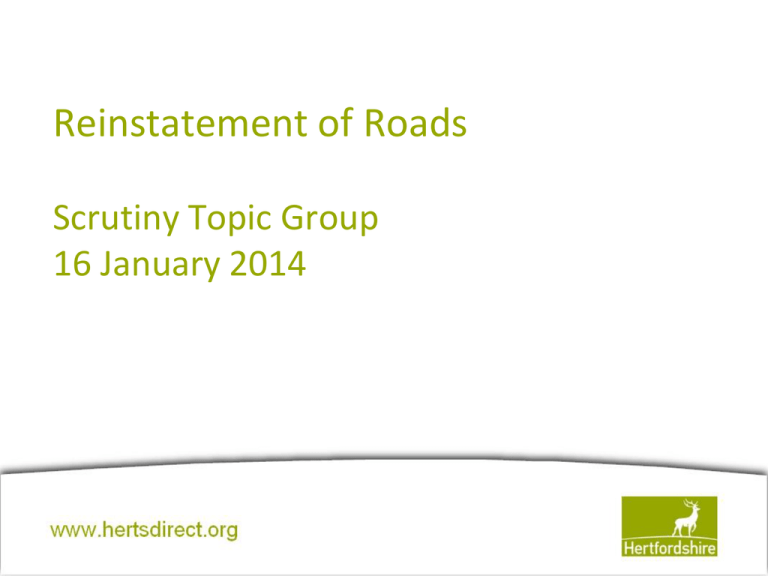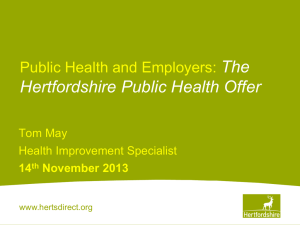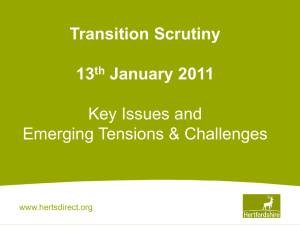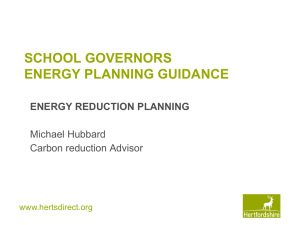Presentation - Hertfordshire County Council
advertisement

Reinstatement of Roads Scrutiny Topic Group 16 January 2014 Reinstatement of Roads Agenda 10:00 Confirmation of Chairman – Tom Hawkyard 10:05 Welcome and Introduction – Tom/Cllr Robin Parker 10:10 Background and General – Jon Prince 10: 45 Co-ordinating Works – Dave Barnett (Stuart Worth) 11:15 Break 11:30 Inspections – Paul Castleman 11:50 Utility View – Gavin Jackson, Affinity Water 12:20 Utility View – Andrew Stone, National Grid Gas 12:50 Lunch 13:50 Business Drivers – Andrew Lee 14:20 National View – David Capon 14:50 Summary Conclusions and Recommendations - Tom 16:00 Finish Reinstatement of Roads Introduction and Background Jon Prince Group Manager Network Strategy and Compliance www.hertsdirect.org Reinstatement of Roads •General principles… • Who can dig, to what rules, •We manage and co-ordinate • But what other drivers are there..? •How we work together •Utopia… •http://www.youtube.com/watch?feature=pla yer_detailpage&v=dg3StO-7zZY www.hertsdirect.org Reinstatement of Roads Street works Works carried out by statutory undertakers, or licensees under section 50 of New Roads and Street Works Act 1991 (NRSWA), or their contractors, to install, inspect, maintain, repair or replace apparatus are known as street works. www.hertsdirect.org Reinstatement of Roads Road works (or “works for road purposes”) These are works usually carried out by highway authorities to repair, maintain or replace highways, which under highways law includes the footway or pavement. This will include works to replace or maintain street lighting, even if carried out on behalf of the council by an electricity distribution company. www.hertsdirect.org Reinstatement of Roads Statutory undertakers Most utility companies are statutory undertakers. Statutory undertakers have a statutory right or duty to install, inspect, maintain, repair, or replace apparatus in or under the street in primary legislation. This legislation is: •Gas Act 1986 as amended by the Gas Act 1995 (schedule 3) •Electricity Act 1989 (schedule 4) •Water Resources Act 1991 (section 159) •Telecommunications Act 1984 as amended by schedule 3 of the Communications Act 2003 www.hertsdirect.org Reinstatement of Roads Local highway authority •In two-tier areas (i.e. where there are district councils and a county council), it is the county council that is the local highway authority (gov.uk) And all working together, JUG, JAG HAUC www.hertsdirect.org Who can dig the highway; 28 (currently) Statutory Undertakers in Hertfordshire 100+ ‘statutory undertakers’, licence holders nationally any of which could work in Herts 4 types of Highway Authority works Types of works; Almost 50/50 split street works v road works Water biggest, Affinity biggest Based on real data from year 1 of permit scheme Slide Reinstatement of Roads What governs everything that we and the utilities do •PUSWA 1950 •NRSWA 1991 •TMA 2004 – including our Network Management Duty •EEPS 2012 •… www.hertsdirect.org New Roads and Street Works Act (NRSWA) www.hertsdirect.org Traffic Management Act (2004) Expeditious movement… www.hertsdirect.org The East of England Permit Scheme (2012) Functionally identical scheme HCC, SoSBC, BBC, LBC HCC Lead, Permits on All Roads Notices v Permits, have to ask to work… The East of England Permit Scheme (2012) Stakeholder engagement Best Practice Reinstatement of Roads Co-ordination of Works on the Highway Stuart Worth Permit Scheme Performance Manager What control does HCC have over who digs in the highway and when? 63,000 works to co-ordinate 1200 per week 242 per day >Prior to November 2012, statutory undertakers served notice of intention to work; > Minimal challenge to the content of these notices e.g. timing, traffic management; > Very few Highways works were notified; > Resulted in either inaccurate or no information in the public domain about roadworks; >High level of road space booked but not used. >With the introduction of the Permit Scheme in November 2012, ALL those wishing to work on the highway must “ask” to do so via a permit application; > The Authority must respond to this request and can also apply conditions; > Minimum lead times and maximum response times apply to ensure works can be effectively co-ordinated. Conditions are the key tool that enable effective coordination of activities on the network and to deliver the benefits and objectives of the scheme. Types of conditions include; Days/Times works can be carried out Type of Traffic Management Residents are informed in advance Bus operators are consulted… There are 13 types in total. Failure by any promoter to adhere to conditions can result in a fine. In summary........... Co-ordination is a delicate balance of everybody's needs. - People don’t want to be held up in road works - People don’t want to be without electric, phone, internet… - People don’t want a patch in that nicely resurfaced road surface… Effective co-ordination and management by the Authority is essential to ensure that traffic disruption is minimised whilst allowing Promoters the required time and space to complete their works. Real time information… http://www.hertsdirect.org/services/transtreets/highways/hhonlineservices/roadworksinfo/?utm_sou rce=HomePage&utm_medium=TopTasks&utm_campaign=RoadworksinfoHP Reinstatement of Roads Inspection and Compliance Paul Castleman Assistant Network Manager, Strategy and Compliance www.hertsdirect.org Inspection for compliance at various stages… County-wide Policy Process Development NRSWA Expert NRSWA / TMA Budgetary Control NRSWA / TMA Consultations Network Strategy & Compliance Functions NRSWA / TMA Invoicing approval County & Regional HAUC Representation Paul Castleman NRSWA / TMA Enforcement and Prosecutions NRSWA / TMA Work Promoters Performance Management NRSWA / TMA Performance and non-compliance Escalations NRSWA Inspection Service NRSWA Recovery of Cost National HAUC Representation Joint Chair on HAUC(UK) Coordination Working Group Permit Strategy & Compliance Stakeholder Lead Officer Central NRSWA Administration Plant Enquiry Service NRSWA Sample and Highways Road Work Inspections NRSWA Enforcement/ Prosecutions FPN Management Service 3rd Party Inspections NRSWA Inspection Service Investigatory (Routine) Inspections Project Manager Richard Hennessy Section 50 Inspections NRSWA invoice Verifications Non Compliance Escalations Defect Follow up Inspections Section 81 Inspections Permit Compliance Inspections Regime Section 74 Inspections New Roads and Street Works Act, 1991. • Section 70 – Duty of Undertaker to reinstate. • Section 71 – Materials, workmanship and standard of reinstatement. • Section 72 – Powers of street authority in relation to reinstatement. • Section 75 – Inspection Fees. • Section 81 – Duty to maintain apparatus, • Section 96 – Recovery of costs or expenses (Defect Follow –up inspections and Temporarily Make Safe charges. NRSWA Inspection types • Sample – A, B and C • Herts Highways Road Works • 3rd Party • Adhoc / Routine • ‘Latent’ Defects • Coring Protocol • Defect non-compliance follow up. • Section 81 • Non-compliance escalations NRSWA Inspection Service – Targets and achievements (9 months from April to December 2013 Inspection Types96564 Inspection Target Inspections carried out ( 9 mths) Passes Failures Sample 'A' 2050 2248 1853 395 Sample 'B' 2055 2206 1787 419 Sample 'C' 2044 2221 1886 335 3rd party 75 113 n/A 113 Adhoc / Routine (Defects only) 1125 1418 N/A 1418 Section 81 975 1329 N/A 1329 HCC action (Make Safe) 125 119 N/A 119 8449 9654 5526 4128 TOTALS = Reinstatement of Roads View for a Utility Gavin Jackson Group Manager, Affinity Water www.hertsdirect.org Replacing your asset Affinity Water identified a need for First Hit Reinstatement in 2006 • Improve Customer Experience • Reduce Section 74 Overstay fines • Minimise Interim Reinstatement issues • Minimise Traffic Disruption Now: • First Hit reinstatement is our requirement on all contracts • R&M contract not paid until Permanent reinstatement achieved www.hertsdirect.org Replacing your asset WORKING TOGETHER In 2013 Affinity Water awarded SQS with a new Reinstatement Contract based on their commitment to Quality and their partnership approach. SQS were looking for someone to work with them on a shared goal of completing 98% of all jobs within 24 hours. Some of the innovations to help achieve this are •OnTrack •QRS – Quality Recycling Services •Defect Overview Pamphlet •Customer calling cards www.hertsdirect.org Replacing your asset WORKING TOGETHER 24hr reinstatement analysis Jobs Completed 10000 8000 6000 Present: 45% 4000 2000 0 2011-2012 2012-2013 2013-2014 Period www.hertsdirect.org 3 5 Replacing your asset WORKING TOGETHER % of first time reinstatement 100% 90% Present: 98% 80% 70% 2009-2008 2010-2009 2010-2011 2011-2012 Period www.hertsdirect.org 2012-2013 2013-Present Replacing your asset WORKING TOGETHER Number of Section 74 Events Section 74 charge reduction analysis 40 30 20 99.9% Success Rate 10 0 2011-2012 www.hertsdirect.org 2012-2013 Period 2013-2014 3 7 Replacing your asset WORKING TOGETHER Amount of Defective Reinstatements Defective reinstatements 600 400 200 0 99% Success Rate 2010-2011 www.hertsdirect.org 2011-2012 Period 2012-2013 2013-2014 3 8 Replacing your asset WORKING TOGETHER Some of the reasons we have for not achieving 1st time reinstatements • Emergency works – esp OOH • Incorrect surface data – can be human error or a physically different construction • Further leaks hampering quality reinstatement • Duration constraints – getting the road open swiftly • Adverse Weather • Third Party intervention www.hertsdirect.org Working with JUG and JAG Work continues to improve our performance through a variety of means, not least of which are the Local and National JUG forums. This provides opportunity to share best practice across Undertakers These feed into their respective HAUC meetings where JAG and JUG come together… We are signed up to the HAUC(UK) Code of Conduct We have sponsored the NJUG awards for the past 3 years as well as being active participants. www.hertsdirect.org Our Customer Outcomes Making sure our customers have enough water Supplying high quality water you can trust Minimising disruption to you and your community Providing a value for money service www.hertsdirect.org Affinity Water Business Plan 2015-20 Some of the areas of interest for a Highways Authority • Universal Metering Programme • Aiming for 90% coverage by 2020 across communities 1, 2, 3 & 5 • Increased Leakage Detection Activity • Reduce leakage by 14% - 27 million litres a day! In effect this will mean that our excavations within your area will double across the next 5 year period. www.hertsdirect.org Slide Slide Water Resources Act 1991 (section 159) Reinstatement of Roads View from a Utility Andrew Stone Group Manager, National Grid Gas www.hertsdirect.org Slide Gas Act 1986 as amended by the Gas Act 1995 (schedule 3) Reinstatement of Roads Business Drivers Andrew Lee Superfast Broadband Programme Manager, HCC www.hertsdirect.org Bucks & Herts Connected Counties Broadband Programme 16 January 2014 Introduction – Why is broadband important? • • • • • • • • • Component of the economic vision for Bucks/Herts Key to competitiveness of Bucks/Herts ‘offer’ Business growth, job creation, entrepreneurship Public sector transformation, service delivery Social equity, sustainability, tele-health, education Growing need for better connectivity, increased speeds Market will deliver circa 84% superfast broadband by 2015 Desire to provide ubiquitous coverage Local and Central Government intervention required Connected Counties • Bucks-Herts partnership – Councils, LEPs and Government • Established in 2011, Local Broadband Plan approved early 2012 • Used Government Framework, coordinated by Broadband Delivery UK • Funding from Bucks/Herts CC, Bucks Thames Valley/Herts LEPs, BDUK and supplier to tackle areas of ‘market failure’ • Underwent substantial procurement process (State Aid, data capture, engagement, evaluation etc) • Award contract to supplier with best solution Contract award • BT awarded contract, publically announced end of June 2013 • Contract value of over £18m – BT contributing £8.6m in capital and operating expenditure • Over 52,000 premises will be able to access superfast broadband • Will also deliver a guaranteed minimum speed of 2 Mbps to all premises • Completion will be by March 2016, 91% NGA coverage • A mixture of technologies will be used such as fibre, emphasising capacity and speed Potential Rollout Issues Communities and stakeholders could potentially be negatively impacted by: • Newly sited cabinets and poles • Road/path closures for access to ducts • Digging up roads/paths to lay new cables Openreach Technology Overview Openreach Deployment DSLAM Cabinet Profile DSLAM cabinet sited to the left of existing PCP cabinet DSLAM cabinet Positioning 50mtrs Existing PCP cabinet location Planning Constraints eg; • PCP & DSLAM <50mtrs apart (exceptionally 100mtrs) – Broadband performance issue • Sited to allow cost effective access to power supply • Not in a flood plain area • Positioned outside restricted areas (e.g. areas of outstanding natural beauty) where possible • Access to footpaths, drives, fire exits etc. not blocked by open doors • Avoid private land if possible • Avoid close proximity of road junctions, zebra crossings, road signs, etc. • Avoid household issues such as visibility from main window, stepping stone across boundaries, etc. • 1.2mtrs clearance to kerb edge • Plinth not positioned over UG services, tree roots, etc. • 100mm clearance behind unit • Required spacing to other street furniture Deployment Schedule High Level Milestones –illustration of Bucks and Herts phase 1 2013 Jun May Jul Aug Sep Oct Nov Dec Jan Feb Mar 2014 Apr May 6 – 9 months average to survey, design and plan per phase. 1st area completes planning March 2014 6 months average deployment per phase. 1 st deployment phase completes Sep 2014 Pre Planning and Mobilisation • • • • Setting up of Programme Loading BT systems Data Scheduling Desktop Planning Detailed Planning Phase (Network) • • • • Network Modelling and Outline Designs External Plant Surveys (duct/cable runs/boxes/locations/power Local Planning Applications / Wayleave applications Production of planning packs Infrastructure Build • • • Exchange build Cabinet Build Spine Build Exchange and Head-end Installation Commission & Test Contract Signed 14th June 2013 Phase 1 M0 Phase 1 M1 Phase 1a M2 First services available 28th May 14 Changes to planning policy to facilitate faster roll-out • Government has agreed amendments to planning policy – a package of amendments to expedite broadband infrastructure rollout • DCMS and DCLG consultation – legislation now amended, came into force on 27/06/13 (5 year duration initially) • Broadband cabinets, overhead poles and lines can be installed without prior approval, except in SSSIs • More details on amendments – http://www.legislation.gov.uk/uksi/2013/1101/made http://www.legislation.gov.uk/uksi/2013/1403/made • Code of Practice established which communications providers must adhere to (BDUK and commercial rollout) – now published Partnership approach to delivery – stakeholders • Opportunity to work collectively to ensure efficient delivery, mitigate issues and learn from the commercial programme rollout • removal of unnecessary cost • maximising speed and coverage • Issues and opportunities associated with planning, highways, utilities/power, community expectation management • Programme governance will act as the conduit for regular and open discussion, partnership approach to addressing issues Collaborating To Resolve Bucks & Herts Challenges • Existence/condition of existing infrastructure, particularly ducts • Costs and timings vary according to the type and quantity of infrastructure required • Power requirements - existing street cabinets don’t require power. Rural NGA street cabinets will require power and likely to be overhead • Road closures more likely in rural areas as roads tend to be narrower • Securing wayleaves e.g. blocks of flats Example - Microtrenching • Process of creating a slot in the road for the installation of fibre optic cables. • Reduces cost, time and disruption of laying new ducts. • Department for Culture, Media and Sport/DfT produced an advice note for local Authorities: “Local and Highways Authorities should consider micro trenching as an acceptable method of installing communications cables”. • Herts Highways have stated this would be acceptable, though depending on a minimum bound layer thickness. What The Programme Needs:• Close / effective working together of all agencies concerned • Quick decisions on difficulties (when encountered) these should be in the minority • Best possible relationship with BT – meet, work things through – not engagement “from a distance” • Effective escalation processes where necessary • Close working relationships with communities – most want better broadband but a few will not like the proposed DSLAM siting etc Our Experience so far • Effective Stakeholder meetings • Resolving outstanding planning issues on commercial programme • A less than favourable history with BT on such matters but willingness to put that behind us? • Appropriate contacts and escalation in place to ensure programme runs smoothly when we do hit difficulties (there are bound to be some). Reinstatement of Roads National View and Future Developments David Capon JAG(UK) Manager, www.hertsdirect.org JAG(UK) – WHO WE ARE What is JAG(UK)? The Joint Authorities Group (UK) Represents all Highway Authorities Voluntary Contribution of Expertise and Time Voluntary Financial Contributions Work alongside LGA DfT Devolved Governments National Joint Utilities Group (NJUG) HAUC(UK) National, Regional and Local Presence Develop Legislation, Codes of Practice, Advice and Guidance Part of GeoPlace Family JAG(UK) – Our Three Top Level Core Values Protection of Assets Protection of Public Purse Public Interest Key Events/ Influences • Economic Pressures • Government Policy – No added costs to Business • Utility costs in political arena • Holes in our Pockets – Utility Works • Economic Growth • Cost of Disruption £4 Billion and rising www.hertsdirect.org Cost to Society • Road traffic has increased enormously (84% increase between 1980 and 2006) • More than 33 million vehicles registered in the UK more two car households than no-car households • Growth projections suggest additional congestion costs of £22 billion every year in England by 2025 • 85 per cent of people tell us that congestion is a serious or very serious problem for the country www.hertsdirect.org JAG(UK) – Reinstatement Concerns Often, the contracts with contractors can prioritise cost over quality which delivers the wrong behaviour and results in poor reinstatements. Evidence from councils is that in many cases the reinstatements do not meet the standard. Road openings have a long term effect on the fabric of the network through water ingress Authorities estimate that nearly 18% of their maintenance budgets (an annual total of £218million) is spent on premature maintenance as a consequence of utility Streetworks. Are we driving the wrong behaviour JAG(UK) – Our View BEHAVIOURAL CHANGE IS THE KEY CONTRACTS WHICH DRIVE RIGHT BEHAVIOUR BASED ON QUALITY AND COST SUPERVISION OWNERSHIP JAG(UK) – Joint Project with Major Contractor Scope Factors of Influence Points of Interest Outcomes so Far Scope CT and JAG joint initiative, BT were part of process Chose two adjacent areas of the UK, one operating best the other the worst. They were managed by same manager Good area was Norfolk, Suffolk, Essex, and Hertfordshire Bad areas was South East, Kent, East Sussex, LB Bromley, LB Bexley What does good look like compared against what bad looked like FACTORS OF INFLUENCE • Relationships with Authority • Permit or non-Permit Authority • Sub-Contractor Organisation, small/large company • Supervisors per gang ratio • Payment mechanisms www.hertsdirect.org POINTS OF INTEREST • Gangs per supervisor • Payment mechanisms, piece work / day rate • Good area majority not permits bad area predominantly Permits • Communications • Defect failures broken down into categories, for instance how does a defect for wrong materials come about? • Workload in terms of managing peaks and troughs and keeping skilled gangs www.hertsdirect.org Points of Interest Contd • Communications • Work Load • Geography of work area, rural versus urban • Equipped to do the job • Job versus service, (price, quality, service ) • Compliance can be achieved www.hertsdirect.org Outcomes so Far • Developed performance statistics, weekly monitoring and focus on key areas. • Can now monitor sub-contractor performance per region • Shares with JAG Bi Weekly Telephone Conference Call • Work ongoing • CT Open and honest discussions, working with JAG has proven useful and this sort of exercise is relevant, has changed thinking and we would work with similar organisations to affect change. www.hertsdirect.org Ct Streetworks in 2013… HA contact improving: – Nationally 60% in 24 hours (10% in June) – Targeting 80% by end January (on track to achieve) Joint Ct / JAG /OR Project: – Selected South East (needing improvement), compared with Anglia – Joint team formed to use learning from Anglia to drive improvement in South East – Outcomes: • • • • % reduction in defects stack - South East: 41% reduction / Anglia: 10% worse (from a low base) % improvement in overdue defects – South East: 43% improvement / Anglia: 0% (low base) % improvement in contact to HA’s – South East: 16% improvement / Anglia: 15% % improvement in underlying new in rate – South East: 10% improvement / Anglia: 0% (low base) Ct Mobile being rolled out Into 2014: – Continue to drive HA Contact improvement – Looking to replicate Joint Project approach elsewhere – Continued development of Ct Mobile www.hertsdirect.org KEY POINTS COMMUNICATIONS COOPERATION COMPETENCY Equals Compliance and Cost balance The networks under the road can be just as congested as the traffic on the surface What could be done differently? Embargo to protect recent works Strategic Traffic Sensitive Streets Full width reinstatements Lane Rental Reinstatement of Roads Summary Who is a works promoter and can dig in the highway? What legislation governs road reinstatements? What control does HCC have over who digs in the highway and when? What other legislation governs when the road may need to be dug up? What could be done differently? Reinstatement of Roads End






